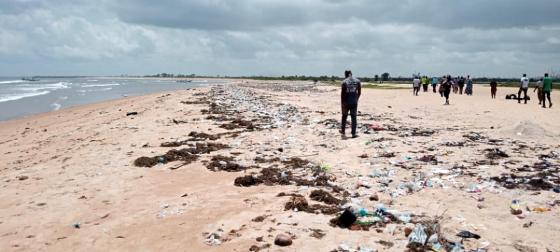Liberia: West Point Gets US$25M Coastal Defense

EPA officials and residents take tours of the West Point beach to establish where the sea wall will be constructed.
....“We can safely announce to you that we now have a total of US$40 million to address climate change issues in communities in Monrovia. And US$25 million of that money is for West Point,” Jeremiah Sokan, of the National Climate Change Secretariat
The Environmental Protection Agency (EPA) has disclosed that about US$40 million is currently at hand to address climate change-related issues in the country as a way of bringing relief to thousands of Liberians who are currently experiencing the excruciating impacts of the global menace.
The fund, which the agency said is being channeled through the Monrovia Metropolitan Climate Resilient Project (MMCRP), will see interventions in erosion-prone communities in Monrovia and its environs, especially the nation’s largest slum community, West Point.
A total of US$25 million has been earmarked by the EPA and its partners to construct a sea wall in that township.
The Coordinator of the National Climate Change Secretariat (NCCS), Jeremiah G. Sokan, disclosed a fortnight ago that the project is financed by a grant of US$17 million from the Green Climate Fund and co-financed by UNDP and the government.
“We can safely announce to you that we now have a total of US$40 million to address climate change issues in communities in Monrovia. And US$25 million of that money is for West Point. We are now ready to start the coastal defense project here and this is why we are here to discuss with you, the residents,” Sokan informed West Pointers.
Liberia is faced with enormous environmental challenges from the impact of climate change. The country’s coastal cities, including Monrovia, are extremely vulnerable to sea-level rise and the increasing frequency of high-intensity storms—all of which contribute to coastal erosion.
This has made the country increasingly vulnerable to climate risks and hazards due to low adaptability, weak human and institutional capacities, lack of the requisite technologies and infrastructure as well as limited finances, among others.
Climate vulnerability severely impacts Liberia’s priority sectors, including agriculture, food security security, health, energy, water resources, forestry and wildlife, fishery, transport, and tourism, among others.
According to experts, the intensity of offshore storms and waves exacerbates coastal erosion that in term results in severe damage to infrastructures, especially homes that fall in the coastal zone.
Additionally, sea-level rise is also threatening the sustainability of the ecosystem and the situation is exacerbated further by encroachment and overexploitation of the mangroves.
“We have to work to mitigate some of these challenges and adapt to somewhere possible,” the NCCS Coordinator Sokan noted. “We are very sure that the assistance from the GCF and other partners will go a long way in addressing some of these issues.”
Mr. Sokan explains some technical details of the project to residents and other stakeholders
He revealed that there are funds also available to educate students and other young people of the nation’s largest slum community about the signs of climate change and how to detect emerging climate-related problems.
In his overview of the initiative, Sokan while speaking at stakeholders' consultation and awareness on ‘Enhancing Climate Information Systems for Resilient Development in Liberia’, revealed that the Sea Wall in West Point is the first of many projects under the Monrovia Metropolitan Climate Resilient Project (MMCRP).
Meanwhile, a representative of the African Development Bank has informed Westpointers that the bank will continue to help in areas that the government deems necessary.
“We are happy to be a part of this initiative. We want to emphasize the safety and the livelihoods of the residents,” he said. “There is a need for more awareness on climate change and its impacts.”
Meanwhile, President George Weah in October of 2021 launched the MMCRP in West Point—an initiative intended to address barriers to effective climate change adaptation in the coastal zone of Monrovia through interventions in three interrelated focus areas: coastal protection, coastal management and diversified climate-resilient livelihoods.
“The project seeks to build the long-term climate resilience of coastal communities by addressing immediate adaptation priorities and creating an enabling environment for up-scaling coastal adaptation initiatives to other parts of Monrovia,” the EPA said at the time.
